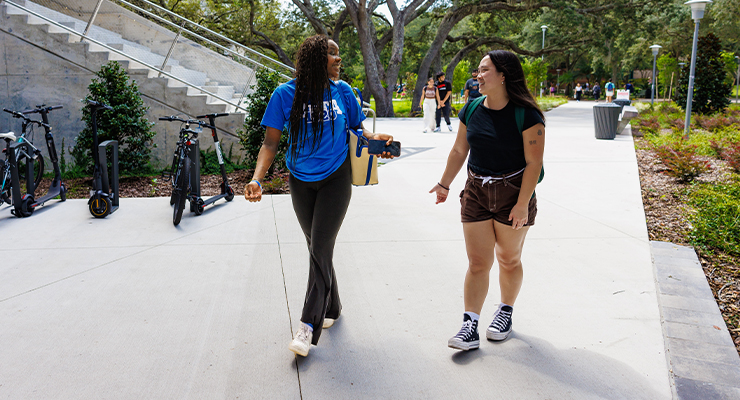How Counselors Can Support High School Seniors
By Rachel Swearingen | Last Updated: Mar 5, 2025

From Rory Gilmore’s graduation speech to Ferris Bueller’s Day Off (and beyond), senior year has
a firm placement in our pop culture. It’s for a good reason, too. It’s such an important year that
anyone who’s been through it can relate to those TV and movie moments.
But in between all those memories, it’s still important for high school seniors to focus on what’s
coming after they walk across the graduation stage. That’s where a high school counselor
comes in—to help remind them of the steps they need to take during this milestone year.
During a student’s senior year, high school counselors can help in a number of ways, like
sending out college application deadline reminders, helping find scholarships, offering ways to
alleviate stress and so much more.
Start offering help to high school students as early as possible.
What does “as early as possible” mean, exactly? Start before they even reach their senior year.
Offer workshops (yes, even in 9th grade) to get students involved, said Mindy Edgeman, college
and career counselor at Bloomingdale High School in Valrico, FL.
“We do freshman night, sophomore night, junior night,” Edgeman said. “There’s a lot of
information and a lot of it, they’re going to say, ‘I wish I would have known.’”
When their senior year starts, give students and their parents all the information they need.
Edgeman says they perform what is called a senior credit check. They look through everything
and make sure the student knows what they need to do to get to graduation, go over grades,
test scores, and other questions.
“That way they have that one-on-one meeting and they’re really sure about what they need to
do to get across the finish line,” Edgeman said.
Along with checking their graduation requirements, make sure they have the information
needed for their college application process. Edgeman gives a 40-slide presentation to the
Bloomingdale High seniors each year and tells them to apply quickly.
“A lot of college applications are due on November 1. So, I try to drill into them that they’re
never going to have a better shot than they do at that first opportunity. They may have second
or third windows, but the seats fill up no matter what,” Edgeman said. “It’s going to get more
competitive as they go.”
They’ll also need letters of recommendation for applications and scholarships, as well as a
resume. Have them work on those early on too, so that they’re not scrambling and trying to
remember what they did the summer after their 8th grade year.
Communicate in every way you can think of.
We all know that we’re bombarded by notifications every day: texts, Facebook messages,
Snapchat, the list goes on. So, it’s easy for important reminders about college application
deadlines or SAT test dates to get lost in between the sports team group chats and everything
else a teenager looks at throughout the day.
“Have multiple forms of communication—send the same thing out multiple ways,” Edgeman
said. When she advertises a message, she uses the Bloomingdale High guidance website, the
school’s X (formerly Twitter) account, a newsletter, the morning show, and blasts on Canvas,
the school’s online learning management system.
By using those multiple forms, it’s easier for counselors to get their message out to both
students and parents—and hopefully, your helpful information won’t end up slipping through
the cracks.

Offer resources on financial aid and scholarships.
It’s never too early to have students look into scholarships and start learning about the Free Application for Federal Student Aid (FAFSA). Even if a student isn’t sure about college, they
should go ahead and apply for FAFSA as well as any state-specific scholarships.
Florida has the Bright Futures program, which awards student scholarships based on grades and
community service hours. However, it’s something that students have to apply for within a
certain timeframe.
Edgeman recalled a former student reaching out to her who went out of state for college and
didn’t submit any community service hours for Bright Futures. The student wanted to know if
they could submit still. In most cases, they won’t take those after a certain amount of time. But
if students apply during their senior year and receive an award, it’s good for up to five years.
“We tell them, make sure if you qualify for Bright Futures, you get all of your stuff in—no
matter what,” Edgeman said.
As a counselor, you can also help students with the FAFSA process. Have them and their
parents create an FSA ID so that everyone will be able to complete their part of the application,
even if a student is reluctant to turn it in.
“Some kids will say they know they’re only going to qualify for loans—I tell them it doesn’t
matter, you still need to do it,” Edgeman said. “This is something that cannot hurt, it could only
possibly help.”
Colleges also use FAFSA data to consider students for any sort of merit-based scholarships, so
encourage your seniors to get that information completed as soon as the application goes live.
Along with FAFSA and state aid, counselors can provide resources on other scholarships. The
Bloomingdale High guidance team has a blog where they share different scholarship
opportunities throughout the year. Consider building a resource like that, so you can share
information easily with students and parents.

Advise seniors who are feeling stressed about life after high school.
No matter how old you are, big life changes are scary. The key to helping with that level of
stress and anxiety, though, involves planning.
“With anything that feels like a monster mountain, it stresses people out and the longer you
wait, the more stressful it becomes because you can’t quit thinking about it,” Edgeman said.
If your students are feeling stressed about college or life after high school, tell them to just start
planning. Even checking off the smallest task on their list could help them feel a bit better about
everything.
“[Tell them] you don’t have to think of it as a big, huge process thing. Tackle one task at a time
and it will feel less overwhelming,” Edgeman said.
Other students could have anxiety over being waitlisted, or not getting into their dream school.
If you encourage them early in the year to apply to several schools, then you’ve helped them on
the front end by giving them a backup plan with safety schools.
Sometimes, students may be stressed about other things besides college applications. Some
may move on to a career instead, and you can help them make choices with aptitude tests, like
the ASVAB or others that will indicate their talents and skills. Edgeman suggests using sites like
the Bureau of Labor Statistics to advise students on occupational outlooks.
We’re here to help you guide your seniors to success.
We know the transition from high school to college (or a career) is a huge adjustment, and that
you have hundreds of seniors who need help. At USF, we offer a counselor toolkit with helpful
resources that you can use as you work with your 12th graders each year.
If you have any questions about USF, our admissions office is ready to help. Reach out to us online, or give us a call at 813-974-3350. We look forward to working with you!


